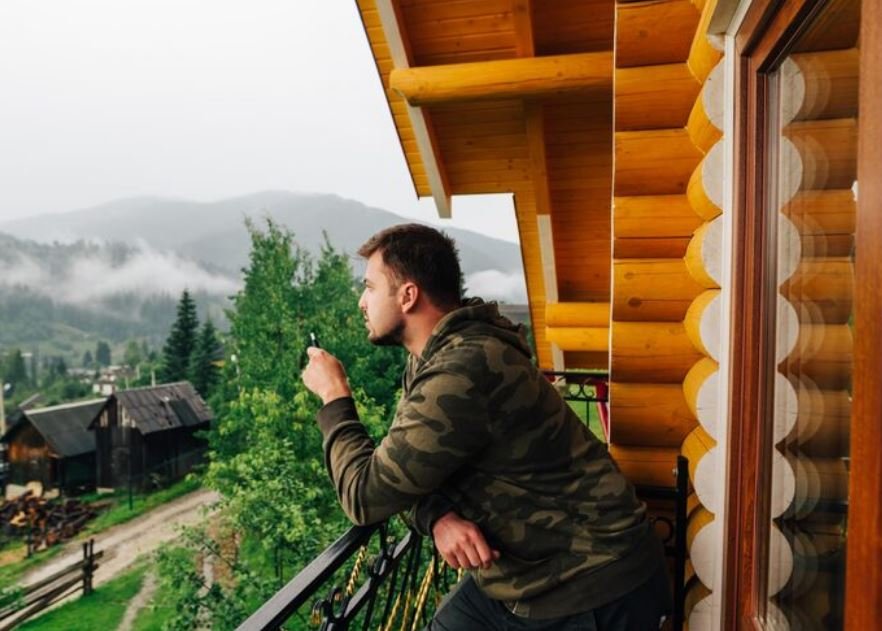
Silence is not just a feature at Quiet Mind Mountain Lodge; it is the main attraction. The California retreat, nestled in Julian’s serene hills, has produced an experience where even tranquility has a cost. Visitors are paying to hear nothing at all, not for gold accents or marble floors. In a time when notifications and never-ending conversations fill even the quietest corners, the idea seems almost radical.
The concept of purchasing silence has become incredibly popular in recent years among tourists looking for emotional clarity. “Silent Suites” with blackout curtains, soundproof walls, and even limitations on electronic devices are available at the lodge. Visitors say the experience is initially confusing but then incredibly healing, almost like the mind finding its rhythm again. Because it’s so uncommon, the silence feels especially opulent.
| Category | Details |
|---|---|
| Property Name | Quiet Mind Mountain Lodge, Retreat & Spa |
| Location | 34540 Engineers Road, Julian, California, United States |
| Style | Luxury mountain lodge and mindfulness retreat |
| Signature Concept | Paid “Silent Suites” and sound-free zones |
| Key Features | Meditation rooms, spa, lake views, vegan dining, private balconies |
| Architectural Theme | Buddhist-inspired interiors and serene outdoor spaces |
| Unique Experience | Guests pay extra for silence and tranquility |
| Ratings | 9.2/10 (Based on major travel sites) |
| Room Rates | $136 to $300 per night depending on suite and season |
| Reference | Booking.com – www.booking.com |
Inspired by Buddhist principles, the lodge was thoughtfully and precisely designed by its founder. The goal of every element, including the open lake views, wooden textures, and gentle lighting, is to calm the mind. As though reverence itself were carved into the walls, guests automatically lower their voices when they enter. Employees who have received mindfulness and meditation training move with a silent attention that accentuates the silence. Here, silence is a state of peace rather than a lack of sound.
The appeal is simple to understand. The lodge acts as a sort of mental detox for many of the guests, who include executives, writers, and entrepreneurs. A producer from Los Angeles likened the experience to “stepping out of static.” A musician who was one of the other guests described it as “the loudest quiet I’ve ever heard.” For a generation used to chaos, the notion that silence can speak louder than noise has struck a powerful chord.
Quiet Mind Mountain Lodge has redefined luxury by integrating tranquility into its identity. The spa on the property provides soundless treatments, substituting natural soundscapes—such as a breeze across the water, the rustle of pine needles, or a far-off bird’s call—for music. Since massage therapists primarily use gestures to communicate, clients are free to focus entirely on the experience without any interruptions. In addition to being calming, the outcome is incredibly successful at reestablishing equilibrium.
The same is true when dining. Vegetarian meals are served quietly, frequently on private balconies with views of Lake Cuyamaca. The food tastes surprisingly richer when the noise subsides, and guests can enjoy dishes like artichoke soup or chana masala in almost complete silence. The silence is fostered rather than imposed. The awareness that every little action—every bite, every breath—matters makes even the air feel cleaner.
There is a noteworthy irony here. Entertainment used to cost more, but now people pay more for its absence. However, in our overstimulated age, this reversal seems normal. Our desire for disconnection increases with our level of connectivity. Although the lodge’s “Silent Suite” costs about 20% more than regular rooms, visitors frequently say the experience is worthwhile. According to reviews, the property is “unlike any hotel on Earth,” “soul-calming,” and “life-changing.”
This pattern is not unique. Similar destinations are starting to appear in Asia and Europe. Silence tourism is subtly growing, from Japan’s monastic-style ryokans to Finland’s Arctic Silence Retreats. However, the Julian retreat’s sincere spiritual basis is what sets it apart as especially novel. It presents silence as a necessity rather than as something new. That authenticity seems especially uncommon in a world where push notifications are a feature of even meditation apps.
Additionally, the lodge reflects broader social trends. People are becoming aware of how exhausting constant sound, both digital and real, is to the mind as remote work blurs the lines between life and work. Quiet Mind provides its guests with highly effective cognitive rest by providing structured quiet. Research indicates that even a few hours of deliberate quiet can improve focus, lower stress hormones, and bring emotional balance back. That research is translated into luxury at the property.
It’s interesting to note that luxury hospitality brands are paying attention. For instance, Aman Resorts now offers “mindful zones” devoid of televisions and Wi-Fi. The silence economy is even being adopted by tech giants; according to reports, firms like Google and Meta send their executives to quiet retreats to improve their creativity and clarity. What was once considered eccentric has evolved into aspirational, the new standard for sophistication driven by wellness.
The design of Quiet Mind also shows how architecture can be influenced by silence. Natural materials like stone and bamboo, muted colors, and acoustic insulation are all features of each suite. The lack of sound encourages focus on details, such as the way the lake’s reflection changes throughout the day or the way sunlight strikes the walls at dawn. Visitors frequently mention observing details they would otherwise miss, such as their heartbeat, breathing, or even the subtle rhythm of falling leaves.
Both economically and environmentally, the lodge’s business model has proven to be very sustainable. Through the removal of superfluous features like loud entertainment systems and a bustling nightlife, the property has drastically decreased its operational footprint. Rather, it makes investments in low-impact technology, handcrafted furniture, and regional craftsmanship. In this instance, the silence creates savings as well as tranquility, which is an especially effective kind of elegance.
The impact on guests is significant. Others find it profoundly healing, while others depart with a fresh appreciation for slowness. Observing stars from the outdoor jacuzzi was referred to as “a form of prayer” by one couple. Another visitor claimed that the silence forced her to face ideas she had been avoiding for years. These encounters unveil a more profound reality: quiet not only soothes the body but also stimulates reflection.
Quiet Mind Mountain Lodge’s success feels like a cultural shift as more tourists prioritize meaningful experiences over material indulgence. Nowadays, luxury is about subtracting rather than accumulating. The lodge restores something priceless to its visitors by eliminating distractions: the capacity to be totally present. Ironically, few people can now afford that presence in their daily lives.
Locations like these have the potential to redefine what luxury travel means in the years to come. The modern traveler seeks essence rather than excess. They prefer quieter meaning over louder entertainment. Quiet Mind Mountain Lodge has not only developed a business strategy by making money off of silence, but it has also tapped into a desire.
